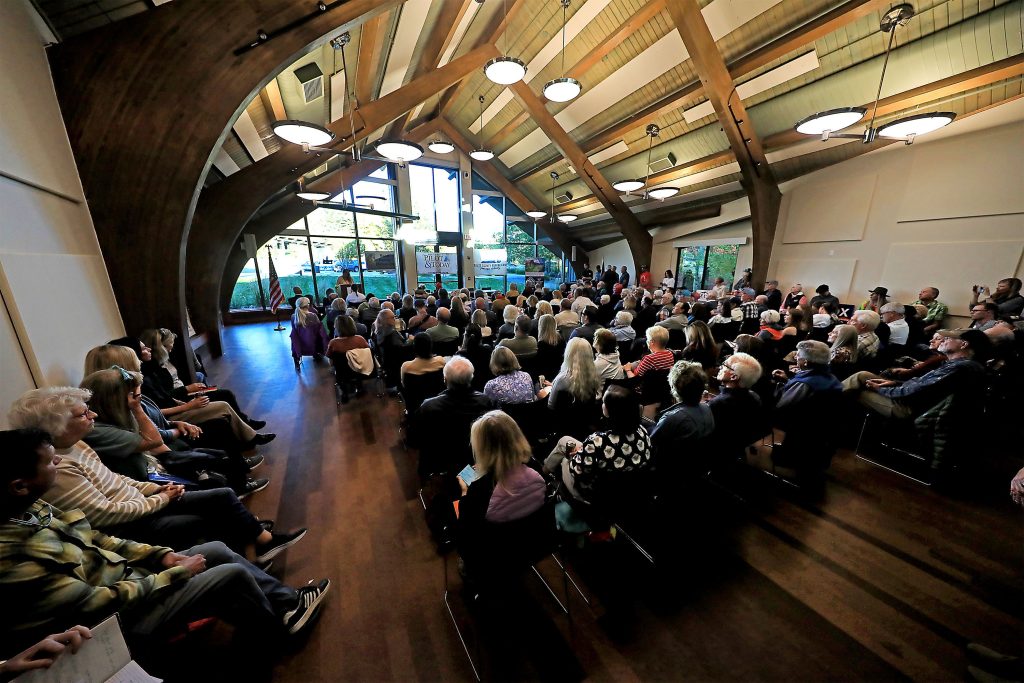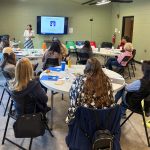Teacher retention, curriculum and administration support drive discussion at school board candidate forum

John F. Russell/Steamboat Pilot & Today
Teacher attraction and retention, workforce housing, academic curriculum and support of the current school district administration headlined the discussion among board of education candidates at Wednesday evening’s forum at Bud Werner Memorial Library.
Hosted by the Steamboat Pilot & Today and sponsored by Altitude Realtors, the event offered an opportunity for community members to hear from candidates for four City Council seats and two school board openings.
Questions were posed by Craig Press Editor John Chalstrom to four candidates for the Steamboat Springs Board of Education: Kim Lemmer, Jane Toothaker, AJ Summers and Lauren Rennolds.
The candidates first addressed the school board’s recent proposals to develop employee housing — an initiative aimed at bolstering teacher attraction and retention, given that lack of housing stability is frequently cited as a primary reason for teacher turnover in Steamboat Springs.
All four candidates acknowledged the significance of the relationship between housing insecurity and the district’s ability to maintain a high-quality teaching staff, with consensus that the district should ramp up its efforts to make teacher housing a reality.
Toothaker and Lemmer expressed their support for the proposed workforce housing development at the district-owned Sleeping Giant parcel. Lemmer called it “just one step in the right direction” and emphasized the district’s need to create further housing solutions.
“The school district needs to partner up with the city, the county, with nonprofits, with anyone we can, including the Colorado Housing Authority, and try to get these projects going,” said Summers. “It’s been a tremendous oversight that the school district hasn’t been doing this over the past decades, like the Aspen School District or Eagle School District, but we need to start somewhere, and we need to start right now.”
Toothaker highlighted the direct relationship between high-quality teachers and student success, noting that “affordable, stable housing…is key to that,” and connected the issue of housing and teacher retention to the lack of local childcare services.
“I met with some teachers today who used to work in the district and are now otherwise employed, and they indicated that childcare was one of the big issues that they had to leave the district,” said Toothaker. “So there are experienced teachers here that we cannot hire because of childcare.”
Rennolds suggested that the district partner with local businesses and land leasing companies to look toward additional workforce housing initiatives, and underscored that teachers should be “rewarded…based on performance and merit and teaching academics, not ideology.”
“While I do think that our main goal is to be transparent with the taxpayers, I don’t think raises across the board will solve the problem,” said Rennolds. “I think it has to be merit-based, it has to be incentivizing and supportive to keep these teachers here.”
Candidates were then asked about the school board’s role in the development of academic curriculum and what proposals they have to improve student learning opportunities.
All four candidates acknowledged that the board cannot set the curriculum itself, but that it can and should enforce transparency for the greater public as to what students are being taught, but otherwise differed in their answers.
“I think we need to partner with many of our great nonprofits around here,” said Summers. “We have tons of groups that are working on arts, outdoor activities, mental health supports, tons of things to get our kids more stuff, more community, and those services can be provided for free if we reach out.”
Toothaker advocated for using existing data to evaluate student outcomes to fill learning gaps.
“What’s working? What’s not working? What outcomes do we need to look at improving?” she said. “We have the data to use on an individual basis and a classroom basis.”
“Parents have a right to know what’s being taught. The schools work best when teachers are being partners with parents,” said Rennolds. “We need to be based in fact — reading, math, science, leaving the social and political topics to families…the overall job of the board is oversight and making sure it doesn’t get political.”
“I think that before adopting curriculum, (it) should be evaluated rigorously by our teachers, and we need to make sure that our curriculums are continually evolving to meet the needs of our changing world — for example, integrating new topics like digital citizenship and artificial intelligence,” said Lemmer.
Finally, candidates were asked a question that sparked audible reactions from the audience: whether or not they support the current school district administration, including the leadership and the board, and why.
Toothaker and Lemmer acknowledged that the district is one of only 17 out of 178 in the state to be accredited with distinction — the highest accreditation a district can receive — but that there is always room to improve.
“I really support our local school board,” said Toothaker. “As far as the administration goes, I have interacted with each of them. I’ve had a lot of conversations at the district level, and…I set up appointments with all the principals, talked with all of them again about what the strengths are, what their challenges are, what’s going well, what they’d like to see improved, how the community can support them more.”
“Something I think we’re doing well is the mental health initiatives in our school,” said Lemmer. “All students get foundational counseling in social-emotional development to develop social skills, which helps to prevent mental health crises and bullying. There are also higher-tier services available for students who need them.”
“All of these are grant-funded and we have a lot of people fighting to get those dollars into our schools to support those students,” she added.
Summers refrained from addressing the question directly, instead using his answer to point to the mental health challenges confronting many local students. He expressed difficulty reconciling these troubling realities with the district’s prestigious accreditation, noting that “something’s not adding up.”
“One of the most common things I’ve heard from parents as I’ve been running…is that, ‘This school district is great, but it hasn’t really been that great for my kid,'” he said. “We are accredited with distinction, but we have kids killing themselves in this community, and we need to do something about that.
“Somewhere, that accountability lies, and I think it’s somewhere in the district office,” Summers continued, “because we can’t sit here and say we’re doing such a good job when we’re losing our highest-potential students because they don’t feel supported.”
Rennolds discussed the current federal lawsuit facing the district, which accuses multiple paraprofessionals of “cruel, discriminatory behavior” towards students with disabilities, calling the allegations “awful” and “heartbreaking.”
“That complaint has been rectified, but there has been no accountability. So I disagree in terms of supporting the staff fully,” said Rennolds. “Teachers and administrators are mandatory reporters of suspected child abuse, and this was never reported. So if something goes wrong in the school, we need full accountability and transparency.”
Election day is Nov. 4.
To view the full video of the candidate forum, visit tinyurl.com/yc5masrd.

Support Local Journalism

Support Local Journalism
Readers around Steamboat and Routt County make the Steamboat Pilot & Today’s work possible. Your financial contribution supports our efforts to deliver quality, locally relevant journalism.
Now more than ever, your support is critical to help us keep our community informed about the evolving coronavirus pandemic and the impact it is having locally. Every contribution, however large or small, will make a difference.
Each donation will be used exclusively for the development and creation of increased news coverage.










